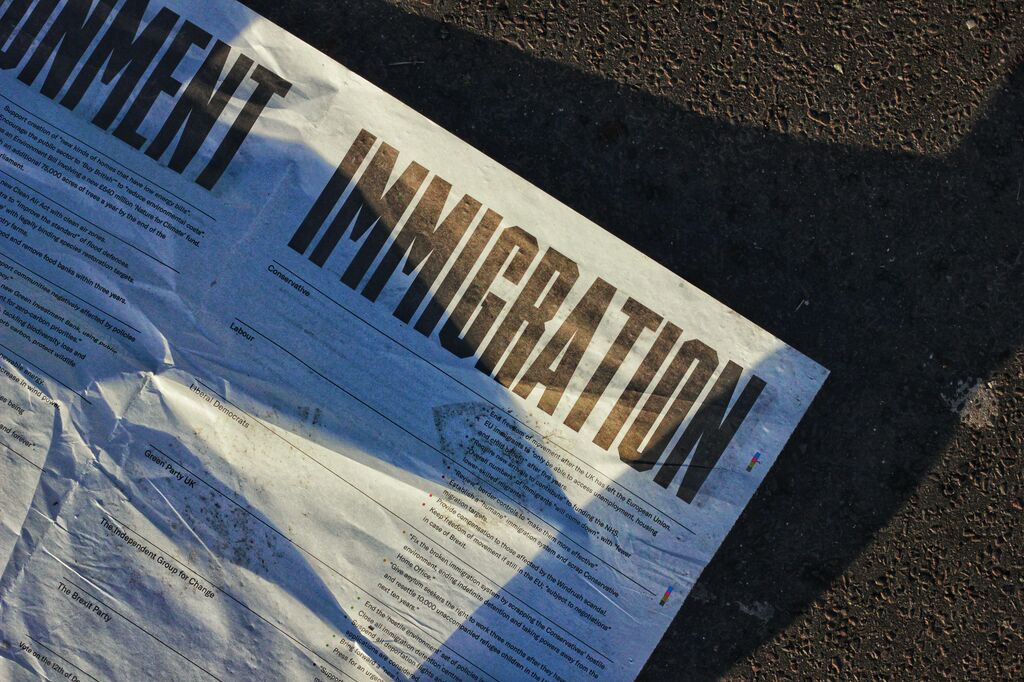What should we make of record net migration levels?

If there is one topic you can guarantee a heated debate on at the moment, it has got to be immigration. Whether it be Brexit or the boats, everyone has something to say.
A couple of weeks ago, the Archbishop of Canterbury made a much-publicised intervention on the Illegal Migration Bill (prompting the typical howls of derision that bishops shouldn’t be commenting on politics, as if the gospel were not supposed to impact all of life!). The Conservatives and the Labour Party seem to be locked on a war to outdo one another in strong rhetoric, regardless of whether they actually have any intention to lower migration levels or not. And just yesterday, the Office of National Statistics announced that net immigration had reached a record high of 606,000.
Meanwhile, perspectives amongst Christian’s roughly fall into two camps: for some, caring for the foreigner is a matter of fundamental Christian ethics, given the foreigner is one of the ‘quartet of the vulnerable’, repeatedly highlighted within the Old Testament. Other Christians would highlight the government’s responsibility – instituted by God – to pursue justice and fairness for its citizens.
The debate at times feels pretty toxic, with dehumanizing language sometimes used about desperate people hoping to escape their own traumatic circumstances. In the other direction fly accusations of racism and xenophobia towards those who think (in a pretty reasonable view!) little more than Britain ought to have some say on who is coming in and out of the country.
And much of it all feels driven (as so many things are) by headlines, rather than nuance. Completely different groups of people get bundled up in public consciousness as one homogeneous category of migrant, despite them bringing different benefits, costs and duties with them. It has also meant that there is a serious danger of the most vulnerable being obscured in the battle of public opinion or in a quest to reduce figures in line with government targets (it is for this reason that at CARE we have major concerns with the Illegal Migration Bill, which will not entitled victims of human trafficking to support or prevention form deportation unless they are helping the police or prosecutors with their enquiries).
Interpreting what the Bible has to say is similarly difficult; although - as ever - there are broad principles we can take from Scripture, God has not given us clear requirements on how to implement a border policy! The Bible talks far more about the status of foreigners within the Old Testament than the New, where the emphasis shifts to the idea of every Christian living as a foreigner here on earth, anticipating our heavenly home; but we cannot merely transpose the commands to Old Testament theocratic Israel, a nation which was set apart for God in every facet of its life (at least in principle, if not always in practice!), to 21st Century democratic Britain. Society is no longer agrarian, borders are no longer so fluid, the world is so much more globalised…
A 2015 Lifeway Research poll in America found that 90% of evangelicals said that “the Scripture has no impact on their views toward immigration reform.” So what principles can we take from the Bible on this topic? I hope the below provides you with some useful principles as you try and navigate through all the outside noise.
1. There is nothing wrong with having a border policy
Immigration is assumed within the Bible as a fact of life, and it normally occurs out of necessity; the very first immigrants are actually Adam and Eve, when they are expelled from the garden of Eden, closely followed by Cain after the murder of Abel.
“So Cain went out from the Lord’s presence and lived in the land of Nod, east of Eden.”
Immigration was normally driven by necessity, whether that be as a result of natural or man-made causes. For instance, we hear in Genesis 12 that Abram (shortly after he has been called to leave Ur by God) has migrated to Egypt due to famine (something his grandson Jacob and great-grandsons were to do later as well).
“Now there was a famine in the land, and Abram went down to Egypt to live there for a while because the famine was severe.”
Immigration might also be due to persecution; we might think of David fleeing from Saul and taking refuge with the Philistines by pretending to be mad. Immigration was simply a fact of ancient living.
But that doesn’t mean that within ancient Mesopotamia, every nation simply had an open-borders policy. In fact, when the Hebrews were migrating from Egypt to the Promised Land, the surrounding nations were nervous. In Numbers 20, we read about how Moses wanted to pass through Edom, and sent messengers to their king: this was a customary thing to do when passing through someone else’s land.
He initially sought permission to pass through with a pledge that they would not drink water from the wells in Edom or walk through their vineyards, only to be met with a reply that if they tried, they would be met in battle. When Moses sought to convince them again by offering to pay a toll, they still refused.
“Again they answered: “You may not pass through.” Then Edom came out against them with a large and powerful army. Since Edom refused to let them go through their territory, Israel turned away from them.”
Such a rejection was unusual within a culture which placed emphasis on hospitality, but attests to the idea of borders, even within the ancient world. Property was protected, and borders were established with boundary stones. In fact we read in Deuteronomy:
“Cursed be anyone who moves his neighbour's landmark.”
Borders are an assumed part of human life within a Christian worldview, and it doesn’t do justice to the Bible to assume a world where they don’t exist.
2. Not all immigrants are the same
One of the things which has been particularly unhelpful in the immigration debate has been the way in which completely different types of immigrant have been bundled together into one overall net migration figure.
There are some types of immigration the government are actually quite keen on, and some which they aren’t: it seems they are quite happy to increase the numbers of foreign students, for instance. In fact, the Education Secretary Gillian Keegan said last week that she is “hugely proud” that 600,000 foreign students now come to study in the UK: this was even a government target!
The government are positive about this immigration, due to its benefits to the economy and to international relations. It is a similar case for NHS workers and care workers, where the number of visas issued has trebled in just a year, due to an expansion of the visa scheme. However, the government are not keen on illegal migration, which is why they are trying to tackle the small boats crisis.
This does mean though that some of the statistics we are reading at the moment are misleading. When we hear that net immigration is 606,000, the government don’t necessarily view that as a problem.
Ultimately, it is the place of leaders and governments to help their citizens to thrive, and to protect their interests. The Bible affirms that God’s purpose for government is to safeguard society and to work for our good.
“For the one in authority is God’s servant for your good. But if you do wrong, be afraid, for rulers do not bear the sword for no reason. They are God’s servants, agents of wrath to bring punishment on the wrongdoer.”
This might mean the government supporting certain types of immigration, if they think it is for society’s good (currently, it seems to be viewed as a short-term fix to get the economy moving). But it also might mean they oppose it too, for other reasons (such as the impact on housing, or for questions around multiculturalism and national identity). There is no Biblical obligation on any government to take in anyone and everyone who wants to move there.
Immigrants within ancient Mesopotamia lived in foreign nations at the nation’s generosity, and there were reasons why they might not be allowed to stay. In Genesis 26, when Isaac has been living in Gerar, and accumulating wealth, the King of Gerar says to him:
“Then Abimelek said to Isaac, “Move away from us; you have become too powerful for us.”
If an immigrant misbehaved within their new country, they might also be asked to leave; one prominent case of this is Abram in Egypt; Abram had tricked the king of Egypt into thinking that Sarai was just his sister and not his wife. When it came to light that this wasn’t true (after God had sent various diseases upon the Pharaoh and the Egyptians), the Pharaoh expelled him from the land (Genesis 12:20).
Indeed, not all immigrants were the same even in ancient times; there seems to have been a distinction in Old Testament law between what we might call ‘resident aliens’ (Hebrew: ‘ger’), who were legally permanent residents of Israel, and what we might call ‘sojourners’ (Hebrew: ‘nekhar’ or ‘zar’) who were only in Israel for a time. Whereas the resident alien was to be treated in just the same way as any Israelite, the sojourner was not afforded the same legal protections: for example, the Israelites were forbidden from charging interest to their countrymen and to resident aliens (Leviticus 25:35-37), but they were not forbidden from charging it to sojourners.
3. Christians are specifically called to defend the vulnerable
As Christians, God has given us a specific call to defend those who cannot defend themselves. This lies at the heart of Old Testament ethics. It is also at the heart of everything we do at CARE: we look to verses like Proverbs 31:8-9 to guide us in our work.
“Speak up for those who cannot speak for themselves, for the rights of all who are destitute. Speak up and judge fairly; defend the rights of the poor and needy.”
It was also central to Jesus in his ministry: he declared that he had come to bring “good news to the poor”, brought healing to the outcasts and the lepers, and spent time with sinners and tax collectors. Social action remained important within the New Testament church. James writes:
“Religion that God our Father accepts as pure and faultless is this: to look after orphans and widows in their distress and to keep oneself from being polluted by the world."
Within the Old Testament, in particular, emphasis is placed upon looking after four main groups of people: the poor, the widow, the orphan and the foreigner (all four are listed together in Zechariah 7:10, but they more commonly appear in different combinations, such as Deuteronomy 10:18, Isaiah 1:17, or Psalm 146:9).
At this point, it would be very easy to take a wrong turn; the word which is typically translated as ‘foreigner’ in these verses in our Bibles, is the Hebrew ‘ger’, meaning ‘resident alien’. Whatever other Scriptural precedent there might be for welcoming foreigners who are here illegally, or foreigners who are here to work for a short time, these kind of verses don't actually provide it. (For that, we would have to look instead to how everyone is made in the image of God, or how Jesus has told us that everyone - even Samaritans - are our neighbour.)
The resident alien seems to be a particular emphasis within the Old Testament because this group was particularly vulnerable (like the other three). Indeed, it is often explicitly linked with the Hebrews’ own mistreatment while they were resident aliens themselves within Egypt: they knew themselves how quickly legal status or past history could be forgotten, as there had arisen a Pharaoh who had not heard of Joseph.
“Do not mistreat or oppress a foreigner [resident alien], for you were foreigners in Egypt”
It is not a new thing for foreigners to be blamed for the ills in society (normally unfairly). We even come across a case of it in the New Testament, when we hear in Acts about how the Emperor Claudius ordered all the Jews to leave Rome. Foreigners have always made easy scapegoats.
Much of the Old Testament testimony about resident aliens is not concentrated on whether they should be allowed to come, but on how they should be treated once they have arrived. On this, God was very clear: they were to be treated just the same as someone who was born in Israel, with access to the same legal protections, being subject to the same laws and punishments for violating them, and even (if they were circumcised) being allowed to take part in the Jewish festivals. This is quite different to the laws in the surrounding nations (in the Code of Hammurabi, for instance, an Ancient law-book, legal punishments differed depending on the class you were from, and resident aliens were given no special protections at all). The attitude towards resident aliens living legally in the land can be summed up by these verses from Leviticus:
“When a foreigner resides among you in your land, do not mistreat them. The foreigner residing among you must be treated as your native-born.”
As Christians, we are called to speak up on behalf of the vulnerable: although we can’t just draw a simple line from the four groups identified within the Old Testament to today, the principle remains.
Some of us might still say the foreigner is a particularly vulnerable group (and certainly, there are certain types of migrant, such as asylum seekers, who would spring to mind). Others might point to those at risk of sexual abuse, or to vulnerable children, or the elderly.
But the question for us all to work out, is who actually are the groups of people today who are most at risk, and if we believe it still is the foreigner, or if we see foreigners living here legally who are not being treated fairly, it is a Christian imperative to speak up on their behalf.
4. God is sovereign over all things — including immigration!
Of course, the Bible is replete with examples of when the immigration of individuals has been a very good thing, under God’s sovereignty.
There have been times when God has brought someone to just the right place, at the right time: we might think of Joseph in Egypt, interpreting Pharaoh’s dreams and managing the corn supply to protect the people from famine.
There have been times when God has brought blessing through immigrants: we might think of the story of Ruth and the grace which God showed to Naomi through Ruth’s marriage to Boaz (and the child she bore). Indeed, Ruth is one of only 4 women to be included in Jesus’ family tree!
And can you imagine how difficult it would have been for the New Testament church to share the gospel without immigration? By the movement of Paul and the apostles around the surrounding nations, God brought his message of salvation to the world.
It is notable that even when the Israelites themselves were taken into exile, despite only being in Babylon for a short time (they did not view themselves as resident aliens, because they did not view Babylon as their home), God told them to bless the city they had been placed in.
“Also, seek the peace and prosperity of the city to which I have carried you into exile. Pray to the Lord for it, because if it prospers, you too will prosper.” (Jeremiah 29:7)
Let us pray - regardless of where we ultimately land on the issue of immigration - that everyone coming to the UK might seek the same for our nation.






